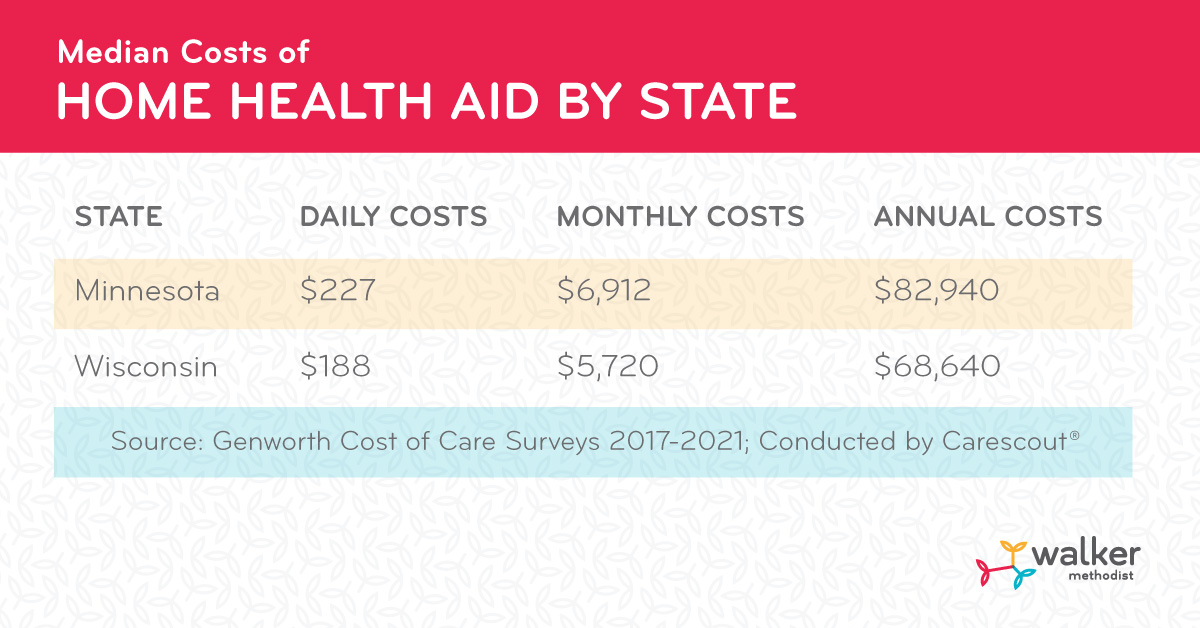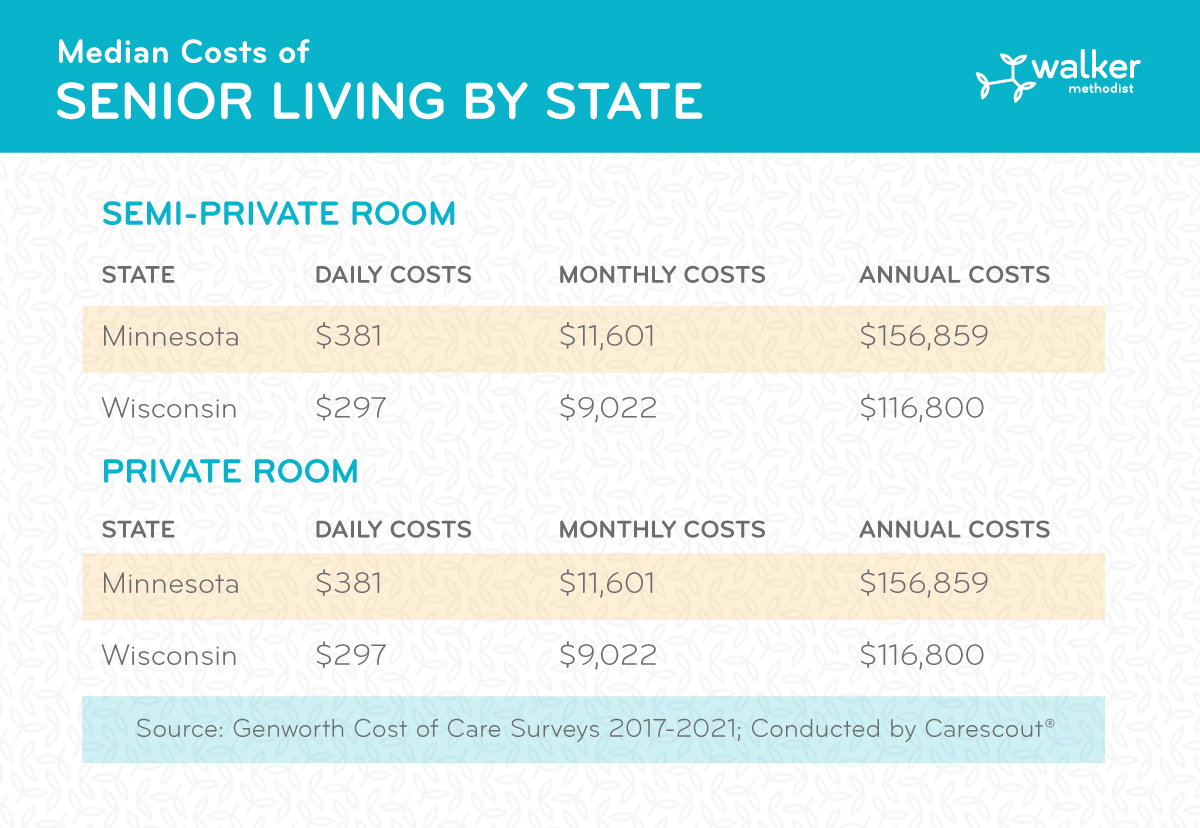Cost of Dementia Care: In-Home Care vs. Senior Living Memory Care
Elizabeth Meyer | Jan 23, 2024
Dementia and Alzheimer's are agonizing diseases that slowly take away memories, personality, and independence. As your loved one declines, making care decisions becomes more challenging.
Two common options are in-home caregivers or memory care facilities. Both allow compassionate support, but costs vary greatly depending on needs and the severity of the disease.
We've compared in-home and facility costs below to aid your search for optimal care during this tender time. As you continue your search, please know our hearts go out to you and your loved one.
What Is In-Home Dementia Care?

In-home dementia care involves bringing caregivers into the home. This allows the person with dementia to age in a familiar environment while caregivers provide assistance, support, and companionship. However, round-the-clock care is usually required as the disease advances, which can mean hiring live-in helpers or multiple caregivers.
In-Home Dementia Care Costs
The cost of in-home dementia care varies considerably based on the amount of care needed. But to provide a glimpse of what you can expect, let’s look at how these costs break down based on the latest Genworth Cost of Care Surveys.

Factors Impacting In-Home Memory Care Costs
Individual needs will determine the final costs for someone requiring memory care, including typical living costs like housing, food, medication, and transportation. Here are the critical factors that increase or decrease the total costs of in-home care.
INITIAL SETUP COSTS
Home Modifications: To ensure a safe living environment, you may need to make home modifications, such as installing handrails or safety alarms.
ONGOING CARE EXPENSES
- Cost of Living Costs: Typical cost of living expenses for seniors, including housing, food, medication, and transportation.
- Caregiver and Staffing Costs: Hiring a caregiver or nurse to provide 24/7 care can be a significant ongoing expense.
- Medical Services and Healthcare Costs: Dementia patients often require specialized medical care, including doctor visits, medications, and therapy.
- Social and Recreational Activities: Engaging your loved one in social and recreational activities can improve their quality of life but comes at an additional cost.
EMOTIONAL AND PSYCHOLOGICAL COSTS
Considering the emotional and psychological costs involved in in-home care is crucial. Providing care at home can be emotionally taxing on family members and caregivers, which is a critical aspect to keep in mind. In some cases, respite care can also be a necessary added expense.
What Is Memory Care Living?

Memory care, on the other hand, involves providing specialized care in a dedicated senior living facility. Memory care communities are specifically designed for dementia or Alzheimer’s patients. They provide trained staff and 24/7 supervised care in a secure environment. Memory care also offers social activities and assistance with daily living.
Memory Care Senior Living Costs
Memory care living typically includes a monthly fee covering room, board, activities, and medical care. However, each community will vary depending on needs and location. Let’s take a closer look at some of these costs based on the latest Genworth Cost of Care Surveys.

Factors Impacting Senior Living Memory Care Costs
Individual needs will determine the final costs for someone requiring memory care, but here are the critical factors that increase or decrease the total costs of senior living memory care.
Initial Setup Costs
- Admission Fees: Memory care units typically charge an admission fee when your loved one moves in.
- Security Deposits: Some facilities may require a security deposit, similar to the setup costs of in-home care modifications.
ONGOING CARE EXPENSES
- Monthly Fees: The primary expense for memory care is the monthly fee, which can vary based on the facility's location and level of care required.
- Medical Services and Health-Care Costs: Memory care facilities offer medical services and therapy, which are usually included in the monthly fee.
- Social and Recreational Activities: Similar to in-home dementia care, memory care units provide social and recreational activities, factored into the overall cost.
Financial Assistance for Memory Care
There are several options to help make memory care more affordable. Looking into financial assistance programs is an important step when considering memory care costs.
LONG-TERM CARE (LTC) INSURANCE
If you have long-term care insurance, it may cover a portion of the costs associated with dementia care, depending on the policy's benefit maximums. Be sure to review your policy to understand the coverage.
VETERANS BENEFITS
Veterans and their spouses may be eligible for benefits that can help offset the costs of dementia care. Explore the available options through the U.S. Department of Veterans Affairs.
MEDICAID COVERAGE
Depending on your loved one's financial situation, Medicaid may cover some or all of the costs of in-home dementia care or memory care living. Medicaid eligibility is based on meeting income, asset, and functional impairment requirements, which vary by state. Be sure to review your coverage at Medicaid.gov.
FINANCIAL ASSISTANCE PROGRAMS
Programs like Medicaid waivers, Alzheimer's Association grants, or state-specific assistance funds may provide financial aid for dementia care. Research programs available in your state.
Find Memory Care Living at Walker Methodist
Choosing between in-home dementia care and memory care is a significant decision. Cost considerations are important, but it's equally vital to factor in your loved one's specific needs, preferences, and the overall quality of care they'll receive.
If you're looking for memory care living in Minnesota or Wisconsin, Walker Methodist provides specialized, compassionate support for loved ones with Alzheimer's, dementia, or related cognitive conditions. Every member of our professional team is dedicated to personal respect and dignity for every resident. Our experienced health-care specialists provide comfort and care – 24 hours a day – in Walker Methodist's custom-designed therapeutic settings.

